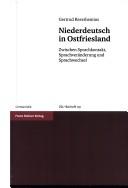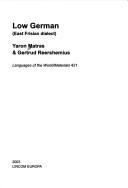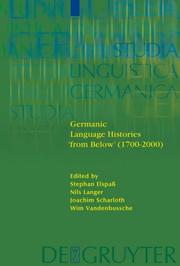| Listing 1 - 5 of 5 |
Sort by
|

ISBN: 3515085718 9783515085717 Year: 2004 Volume: 119 Publisher: Wiesbaden Steiner
Abstract | Keywords | Export | Availability | Bookmark
 Loading...
Loading...Choose an application
- Reference Manager
- EndNote
- RefWorks (Direct export to RefWorks)
German language --- Grammar --- Dialectology --- Friesland --- Low German language --- Low German language - Germany - Ostfriesland

ISBN: 3895868450 3895866164 Year: 2003 Volume: 333 Publisher: München LINCOM Europa
Abstract | Keywords | Export | Availability | Bookmark
 Loading...
Loading...Choose an application
- Reference Manager
- EndNote
- RefWorks (Direct export to RefWorks)
Low German language --- Dialectology --- Wolof language --- Wolof (Langue) --- Grammar. --- Grammaire --- Dialects --- African languages
Book

ISBN: 9781800414235 Year: 2024 Publisher: Bristol Blue Ridge Summit
Abstract | Keywords | Export | Availability | Bookmark
 Loading...
Loading...Choose an application
- Reference Manager
- EndNote
- RefWorks (Direct export to RefWorks)
Book

ISBN: 3110348985 9783110348989 9783110348996 3110348993 9783110386462 3110386461 9783110347234 3110347237 3110386461 Year: 2016 Publisher: Berlin Boston
Abstract | Keywords | Export | Availability | Bookmark
 Loading...
Loading...Choose an application
- Reference Manager
- EndNote
- RefWorks (Direct export to RefWorks)
This book, situated within the framework of Comparative Interactional Linguistics, explores a family of fourteen discourse markers across the languages of Europe and beyond (Yiddish, Hebrew, Russian, Polish, Romani, Estonian, Finnish, Upper Saxonian and Standard German, Dutch, Icelandic, and Swedish), arguing that they go back to one, possibly two, particles: NU/NÅ. Each chapter analyzes the use of one of the NU/NÅ family members in a particular language, usually on the basis of conversational data, feeding into a comprehensive chapter on the structure, function, and history of these particles. The approach taken in this volume broadens the functional linguistic concept of ‘structure’ to include the sequential positioning of the particles and their composition, and the concept of ‘function’ to include the conversational actions performed in interaction. Employing conversation analytic methodology thus enables a study of the ways these particles acquire meaning within certain sequential and action environments -- both cross-linguistically and with regard to the grammaticization of the particles. All this sheds light on the borrowing patterns of NU/NÅ across the languages. With contributions by Peter Auer, Galina B. Bolden, Gonen Dori-Hacohen, Andrea Golato, Harrie Mazeland, Auli Hakulinen, Helga Hilmisdóttir, Leelo Keevallik, Hanna Lehti-Eklund, Anna Lindström, Yael Maschler, Yaron Matras, Gertrud Reershemius, Mirja Saari, Lea Sawicki, Marja-Leena Sorjonen, Heidi Vepsäläinen and Matylda Weidner.
Linguistics --- Discourse markers --- Discourse connectives --- Discourse particles --- Pragmatic markers --- Pragmatic particles --- Discourse analysis --- Pragmatics --- Linguistic science --- Science of language --- Language and languages --- E-books --- English language --- Germanic languages


ISSN: 18615651 ISBN: 9783110193350 3110193353 311092546X 9783110925463 Year: 2011 Volume: 86 Publisher: Berlin Boston
Abstract | Keywords | Export | Availability | Bookmark
 Loading...
Loading...Choose an application
- Reference Manager
- EndNote
- RefWorks (Direct export to RefWorks)
Focusing on the sociolinguistic history of Germanic languages, the current volume challenges the traditional teleological approach of language historiography. The 30 contributions present alternative histories of ten 'big' as well as 'small' Germanic languages and varieties in the last 300 years. Topics covered in this book include language variation and change and the politics of language contact and choice, seen against the background of standardization processes of written and oral text genres and from the viewpoint of larger sections of the population.
Germanic languages --- History --- Variation --- Standardization --- Political aspects --- History. --- Political aspects. --- Variation. --- Teutonic languages --- Indo-European languages --- Standardization&delete& --- Germanic languages - History --- Germanic languages - Variation --- Germanic languages - Standardization - History --- Germanic languages - Standardization - Political aspects --- Germanic languages. --- Historical Linguistics. --- Historical Sociolinguistics. --- Historical grammar. --- Social History. --- LINGUISTIQUE HISTORIQUE --- LANGAGE ET LANGUES --- SOCIOLINGUISTIQUE --- NORMALISATION --- PAYS DE LANGUES GERMANIQUES --- VARIATION --- ASPECT POLITIQUE --- Langues
| Listing 1 - 5 of 5 |
Sort by
|

 Search
Search Feedback
Feedback About UniCat
About UniCat  Help
Help News
News